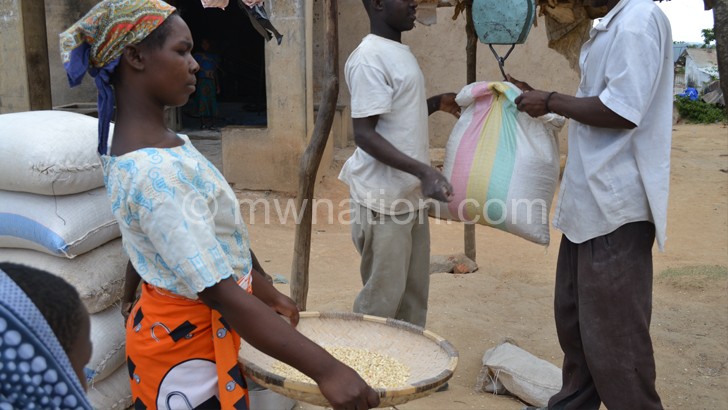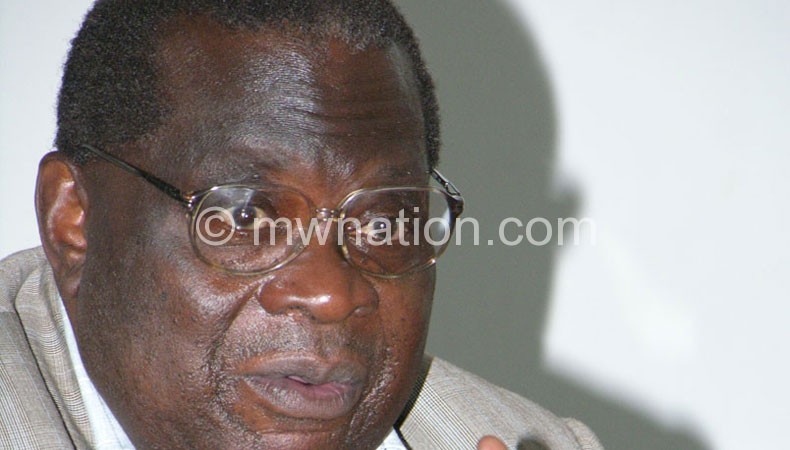Inflation stubbornly high: Is govt clueless?
In Zomba, a 50 kilogrammme (kg) bag of maize which cost K3 617 in June last year, has shot up to K6 800 this year. A 50 kg bag of charcoal—one of the mostly used source of energy by both rural and urban dwellers—which used to cost K5 357 in Lilongwe 13 months ago or June 2014, is today selling at K8 571.
For an average income earner like Lucius Makina who lives in Manje in Blantyre, one packet of Boom—a widely used washing soap by many households across Malawi—has seen its price edging up from an average of K205 in June last year to around K250.

“I am a neighbourhood patrol watchman and get paid K18 000 every month, these days when I pay house rent of K6 000, I remain with only K12 000 to survive an entire month,” says Makina, a father of six.
“When I take out K6 500 for a bag of maize, I remain with very little for our survival. I have to take up odd jobs (ganyu) to earn additional money to support my family. I am dying inside due to overworking,” he adds.
This is just a snap shot of how the cost of living has quickened within a space of a year.

for govt next year
Data between June 2014 and June 2015, compiled by the Lilongwe-based institution, Centre for Social Concern (CfSC) through its illustrious project called the Basic Needs Basket (BNB) and random visits to some business places including flea markets in Lilongwe and Blantyre, Business Review found that prices for most basic food items such as tomatoes, onions, usipa, bread and essential non-food items have gone up.
House rentals and utility service bills such as electricity and water have all gone up. As schools open for new term next week (on September 7), most private schools have adjusted fees, to catch up with soaring prices of goods and services.

in the economy
Soaring inflation
Malawi’s inflation remains comparatively the highest in the Southern Africa Development Community (Sadc) region at 22 percent in July. The recent continued increase in inflation rate—the rate at which prices of basic goods and services sustainably increase in the economy—vindicates our random survey and only points to a situation where Malawians are simply being slapped with higher than expected prices.
It is important to distinguish here between demand pull and cost-push inflation. The former simply arises when there is excess demand for goods and services over supply, while the latter is generally caused by an increase in the price of inputs like labour and raw-materials.
In the current context, Malawi appears to be reeling from the cost push inflation as production costs increase further, prompting businesses to pass on the cost of production to final end users, in this case a consumer.
Recently, the exchange rate massively depreciated and many businesses have taken advantage of the kwacha fall against other major currencies making imported raw materials and goods expensive.
Although those on the driving seat such as Finance, Economic Planning and Development Minister Goodall Gondwe and his monetary policy counterpart Reserve Bank Governor Charles Chuka are optimistic that inflation will likely average 16.5 percent this year, the recent successive increases in the headline inflation should be frustrating them.
Since April 2015, headline inflation has continued to increase unabated from 18.8 percent to 19.5 percent in May, while in June it went up to 21.3 percent before settling at 22.2 percent in July, according to National Statistical Office (NSO) data.
This continued increase in inflation is on the back of food shortages this year. The country recorded 27.7 percent decrease in food production due to floods that killed 176 people and washed away thousands of hectares of food crops. At 50.2 percent, maize is attached more weight in the consumer price index, a basket used to compute inflation figures.
But while government expects inflation to average 16.5 percent by December 2015, some institutions are pessimistic on the projection. In 2014, inflation rate averaged 28.3 percent, failing to reach the single-digit mark as targeted in the plagued Economic Recovery Plan (ERP) document.
For example, the European Intelligence Unit (EIU) expects inflation to average 17.1 percent in 2015 then moderate to an average of 9.7 percent in the period 2016 to 2019 as productivity improves and as the currency depreciation slows and domestic food production improves.
No end in sight
With most macroeconomic indicators in red, some economic experts argue that it will be a tallorder for Gondwe and his team to achieve the much-needed macroeconomic stability soon, which also entails a single digit, but stable inflation.
At some point between 2007 and 2011, Malawi enjoyed single digit inflation due to stable exchange rate during the fixed exchange rate regime and also good maize harvests.
But, as many have observed in the past that was short lived as during that time fixed exchange rate regime led to numerous economic challenges including run down on foreign reserves. It was terrible!
There is a glaring maize deficit this year, and that alone is a nuisance to monetary authorities who are tirelessly working towards containing the shocking increases in the price of goods and services on the market.
And there is yet another force likely to rear its ugly head in the fight against inflation; that is the recent cut in the Liquidity Reserve Requirement (LRR), which is simply a mandatory fraction of bank deposits that are supposed to be kept at the central bank, but earn no interest.
The rate was slashed from 15.5 percent to 7.5 percent effective August 1, 2015, to enable banks to lower the spread between the prime lending rate and the policy rate.
Since the revision in LRR ration has already seen some banks reducing their lending rates from a range between 37 percent and 39.5 percent to a range from 32 percent to 33.5 percent.
The reduction in LRR has already poured into the market in excess of over K30 billion, increasing liquidity levels in the process.
This is ‘cheap’ money as economists christen it.
However, what this simply means is that the probability is high that too much money will chase few goods, exerting inflationary pressure in the process.
Nico Asset Managers Limited have also predicted ‘trouble’ in as far as inflation trajectory ahead is concerned.
“Inflation is expected to remain elevated, as a result of the rising food prices from lower than expected harvest and recovering global oil prices,” the firm said in its monthly economic report for the month of June 2015.
Looking ahead
As the battle against taming inflation rages on, economic experts are offering solutions. For instance the Economics Association of Malawi (Ecama) believes that nothing new is on the table in terms of advice to taming inflation and recommends that the strongest recommendation is implementation.
Reducing recurrent expenditure and increasing food supply are some of the measures that the government can adopt to tame Malawi’s runaway inflation, the Economics Association of Malawi (Ecama) suggested in a paper presented last month.
Ecama says government needs to immediately implement such deliberate policies before the situation gets out of hand.
In one of the presentations made during a public discussion forum the body held in Blantyre last month, Ecama’s executive member Esnart Lweya said government should tally its recurrent expenditure with domestic revenues to avoid budget mismatch.
“We have also looked at the fiscal policy that supports monetary policy. We are suggesting a sound fiscal policy where we are looking at ensuring that our recurrent expenditures are within the domestic revenues, this is to reduce the budget deficit that is there,” she said.
Lweya hinted on the need for Treasury to adopt a sound fiscal policy by focusing on expenditures targeted towards boosting private sector activities.
The Ecama paper also suggests improved agricultural activities in the country by among other things ensuring increased food production.
“There is need to modernise the agriculture sector. We need to increase efficiency and number of harvests in a year,” Ecama suggested.
Press Corporation’s Group chief executive officer Mathews Chikaonda at the meeting called on RBM to consider measures of addressing exchange rate and base rate concerns as a mechanism to tackle the inflation upsurge.
“The issue is how to make things happen, and that will be attained by addressing policy inconsistency in the economy. We need to address the issue of base lending rates and exchange rates such that they are favourable for the market,” he advised government.
During the meeting research and policy analyst at RBM Kisu Simwaka said the effects of the rates on inflation are relatively lower than speculated.
“When a market is misbehaving, we cannot just stand by and watch as a monetary authority. We have to bring in some discipline. Somehow, we still have to bring in some measures,” he was quoted by Daily Times.
But while it is cost-push inflation that seems to piercing into the pockets of many Malawians, experts say there is an urgent need to focus on policies that will improve foreign reserves, improving the trade balance by growing exports, support ‘Buy Malawi campaign’ while ensuring import substitution.
They argue that for several times, agricultural-related institutions have advocated heavy investment in machinery, seed research and irrigation to increase efficiency and predictability of production and that food production must be looked at as a potential commercial avenue that could generate foreign exchange reserves in the future.
They say this could help increase excess supply of products over demand thereby easing the price of goods and services.
It is, therefore, pleasing to hear Gondwe saying that government has taken steps to ‘jump start’ the economy while at the same time sympathising with Malawians for passing through difficult times.





In the first place, Makina mentioned in the story wasn’t supposed to make 6 children when he pretty well knew that his income base is so narrow. Pf course government must work on these issues.